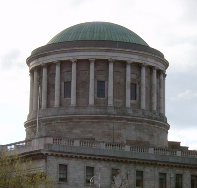From Michael Lines on Slaw:
UNESCO and its Communication and Information Sector have just released a new edition of Freedom of information: a comparative legal survey, and it is free online.
 The survey was prepared by Toby Mendel, Law Programme Director with Article XIX. From the survey’s homepage:
The survey was prepared by Toby Mendel, Law Programme Director with Article XIX. From the survey’s homepage:
The importance of the right to information or the right to know is an increasingly constant refrain in the mouths of development practitioners, civil society, academics, the media and governments.
What is this right, is it really a right and how have governments sought to give effect to it? These are some of the questions this book seeks to address, providing an accessible account of the law and practice regarding freedom of information, and an analysis of what is working and why.
The analysis in the book is organised around a number of key features of an effective Freedom of Information regime:
- MAXIMUM DISCLOSURE
Freedom of information legislation should by guided by the principle of maximum disclosure
- OBLIGATION TO PUBLISH
Public bodies should be under an obligation to publish key Information
- PROMOTION OF OPEN GOVERNMENT
Public bodies must actively promote open government
- LIMITED SCOPE OF EXCEPTIONS
Exceptions should be clearly and narrowly drawn and subject to strict “harm” and “public interest” tests
- PROCESSES TO FACILITATE ACCESS
Requests for information should be processed rapidly and fairly and an independent review of any refusals should be available
- COSTS
Individuals should not be deterred from making requests for information by excessive costs
- OPEN MEETINGS
Meetings of public bodies should be open to the public
- DISCLOSURE TAKES PRECEDENCE
Laws which are inconsistent with the principle of maximum disclosure should be amended or repealed
- PROTECTION FOR WHISTLEBLOWERS
Individuals who release information on wrongdoing – whistleblowers – must be protected
Ireland is not one of the countries assessed in this report, but since Elaine Byrne argued in yesterday’s Irish Times that legislation is need to protect whistleblowers, I am not sanguine that the Irish legislation (1997 as amended in 2003) would measure up well against these principles.…
 Ireland’s leading celebrity academic blogger discusses a the theme of Laptops in class:
Ireland’s leading celebrity academic blogger discusses a the theme of Laptops in class:






